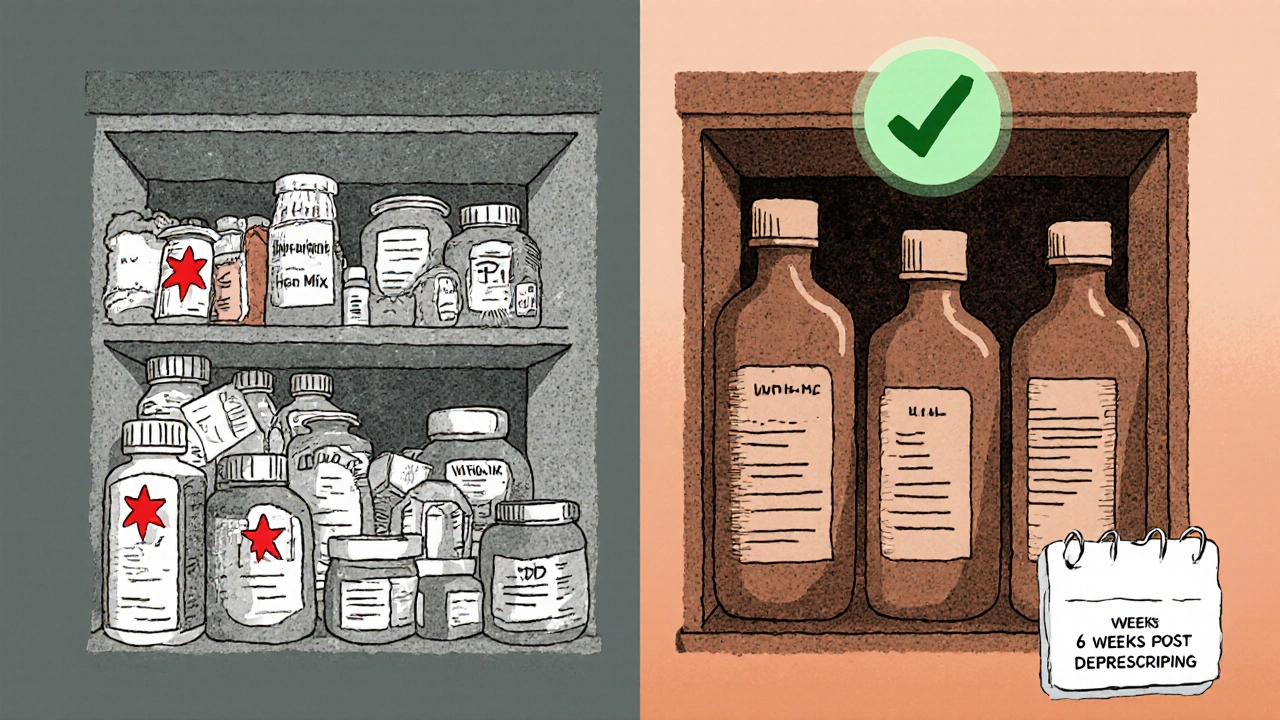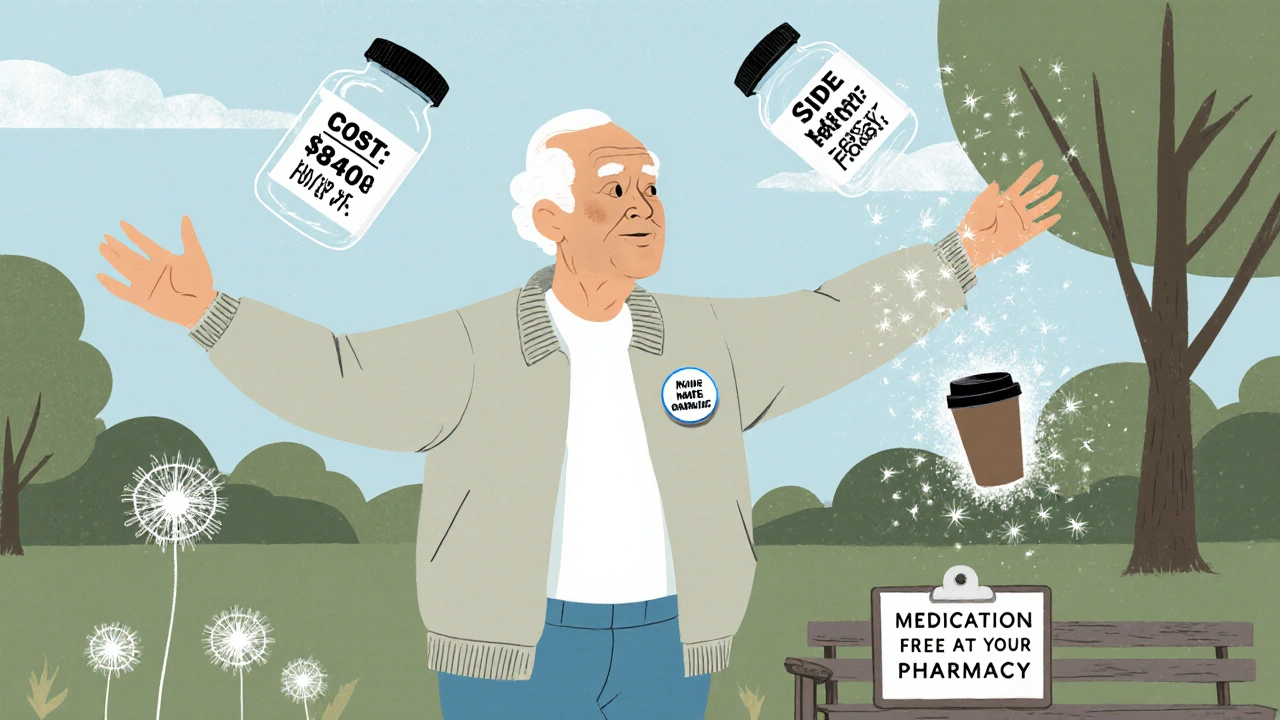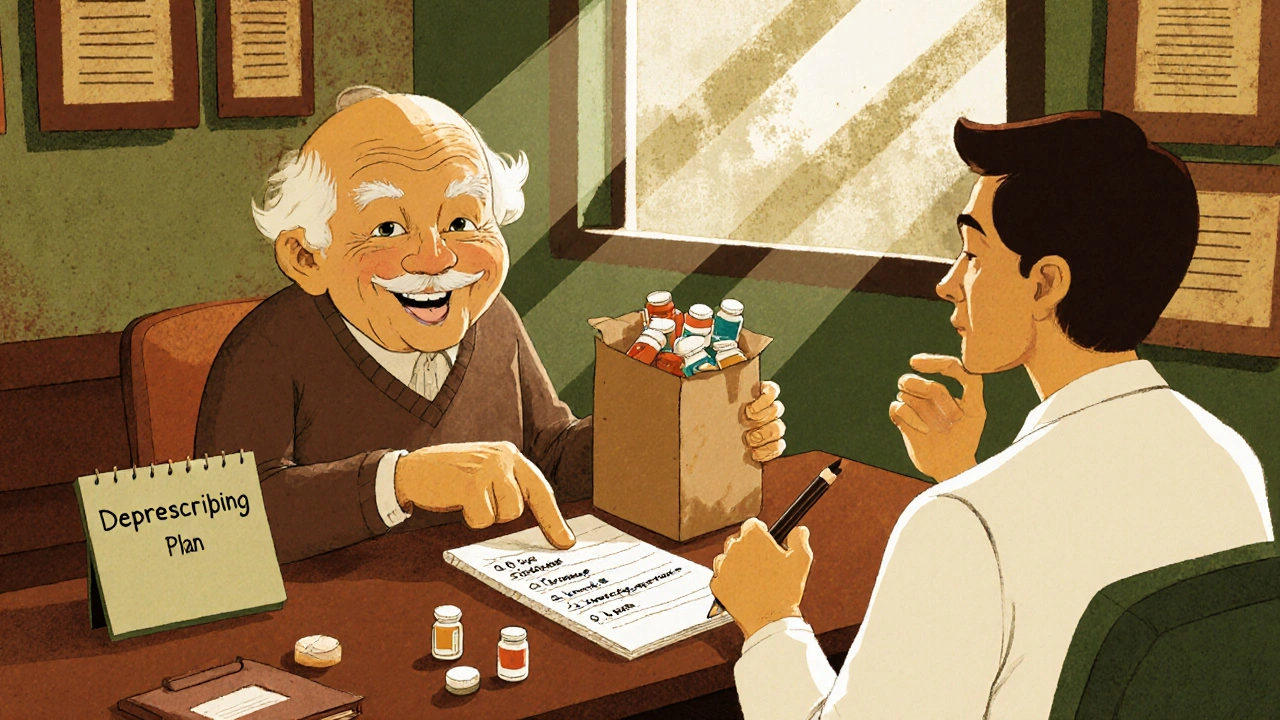Every year, millions of people in the U.S. pay hundreds - sometimes thousands - of dollars for medications they no longer need. It’s not because they’re overmedicated by accident. It’s because no one ever asked if they still needed them. Deprescribing isn’t about quitting drugs cold turkey. It’s about having a smart, safe conversation with your doctor to stop medications that no longer help - and might even hurt you. And the best part? It can save you hundreds, even thousands, a year.
Why You Might Be Taking Medications You Don’t Need
Think about your medicine cabinet. How many pills are there? Maybe you’re on five, ten, or even more. Some were prescribed for short-term issues - like acid reflux after surgery - but kept going because no one ever said to stop. Others were added for new conditions, but over time, your body changed. Your kidneys slowed down. Your liver processed things differently. Your lifestyle improved. But the pills stayed. According to a 2019 study in JAMA Internal Medicine, 41% of older adults take five or more medications at once. That’s called polypharmacy. And while some of those drugs are essential, many aren’t. The Beers Criteria, a widely used guide for doctors, lists 53 medications that are often risky for people over 65. These include sleep aids like diphenhydramine (Benadryl), certain antidepressants, and even some blood pressure pills that can cause dizziness, falls, or memory problems. A 2022 study by the National Council on Aging found that 18% of people who tried stopping meds on their own ended up in the ER or doctor’s office with bad reactions. That’s why you need your doctor’s help - not just a Google search.What Deprescribing Actually Means
Deprescribing isn’t just stopping pills. It’s a planned, step-by-step process where you and your doctor review every medication, ask: Is this still helping? Is it worth the risk? It’s especially important for people with chronic conditions like diabetes or heart disease, where meds were started years ago and may no longer be needed. For example, a 72-year-old woman in Ohio was taking a $120/month sleep aid, a $45/month vitamin D supplement, and a $75/month herbal remedy. Her cardiologist checked her blood levels and found her vitamin D was fine. The herbal remedy was redundant with her prescription meds. After a 6-week taper, she stopped all three. Her annual medication cost dropped by $840. No side effects. No rebound issues. Just savings. The same thing happened to a Reddit user named “SeniorSaver87.” He stopped a $90/month vitamin D pill after his blood test showed normal levels. He also quit a $75/month herbal supplement his aunt swore by. That’s $1,980 saved in one year - just by asking questions.How to Prepare for Your Deprescribing Conversation
Don’t walk into your appointment hoping your doctor will notice something’s off. They’re busy. You need to lead. Start by making a full list of everything you take:- Prescription drugs (include doses and why you were prescribed them)
- Over-the-counter meds (ibuprofen, antacids, sleep aids)
- Vitamins, minerals, and herbal supplements
- Cost of each item per month (check your pharmacy receipt or online account)
- Why am I taking this medication?
- What’s it supposed to do for me right now?
- What are the side effects? Could it make me dizzy, confused, or fall?
- Is this still helping after all this time?
- Can I stop it? Can I lower the dose?
- What should I watch for if I stop?
- Who should I call if something changes?
What Your Doctor Will Do
Good doctors use tools like the Medication Appropriateness Index (MAI), which scores each drug on 10 factors - like dose, duration, and interaction risk. It takes about 7 minutes per pill, but it’s worth it. They’ll also check the Beers Criteria and your lab results to see if any meds are no longer needed. They won’t pull the plug on everything at once. That’s dangerous. Instead, they’ll prioritize:- Drugs with the highest risk (like sedatives or anticholinergics)
- Drugs with the lowest benefit (like statins for someone with limited life expectancy)
- Drugs with the highest cost

How Long Does It Take to Deprescribe?
It’s not a one-time event. It’s a process. Most medications are tapered slowly - over 4 to 12 weeks. Some, like antidepressants or blood pressure pills, need even longer. Stopping too fast can cause rebound effects. A 2019 BMJ study showed that 12% of patients who stopped blood pressure meds too quickly had their numbers spike dangerously. Your doctor will give you a plan: “Reduce this pill by half every two weeks, then stop. Call if you feel lightheaded or have trouble sleeping.” They’ll schedule a follow-up in 4 to 6 weeks to check how you’re doing.How Much Money Can You Save?
One unnecessary $50/month medication = $600 saved a year. That’s real. But the bigger savings come from avoiding hospital stays. Medication-related hospitalizations cost an average of $15,700 per event, according to 2022 Medicare data. The U.S. Deprescribing Research Network says 37% of these hospitalizations in adults over 65 are preventable. That’s why Kaiser Permanente’s program saved $1.2 million annually across its system - not just from cheaper pills, but from fewer ER visits and falls. The Lown Institute estimates that inappropriate polypharmacy costs the U.S. system $30 billion a year. For you? Eliminating just two unnecessary prescriptions could save you $1,000 or more. And if you’re on Medicare Part D, you can get free medication reviews from your pharmacist. 85% of pharmacies offer this service. Ask them: “Can you check if any of my meds are redundant or too expensive?”What If Your Doctor Says No?
Some doctors don’t bring up deprescribing because they’re worried about liability, or they’re pressed for time. The average primary care visit is just 15.7 minutes, according to MGMA data. But you can still push back. Say: “I’ve been reading about deprescribing. I’m worried about side effects and costs. Can we review my meds together? I’d like to start with one.” If they refuse, ask for a referral to a geriatrician or a pharmacist who specializes in medication reviews. Many Medicare Advantage plans now cover these services. You can also ask for a “medication therapy management” (MTM) session - it’s free under Part D if you’re on multiple drugs.
What Happens After You Stop?
Some people worry they’ll feel worse without their meds. But often, they feel better. Less drowsiness. Better sleep. Clearer thinking. Fewer stomach issues. One woman in Florida stopped a muscle relaxant she’d been on for 8 years. She said: “I didn’t realize how foggy I was until I wasn’t foggy anymore.” But monitor yourself. Keep a simple journal:- Energy levels
- Sleep quality
- Mood
- Any new symptoms (dizziness, headaches, heart palpitations)


Denise Wiley
I stopped my old blood pressure med last year after my pharmacist flagged it. I was taking it for 12 years and never felt better-just tired and dizzy. My doc was hesitant but we tapered slowly. Now I feel like I can breathe again. No more 3pm naps. Saved $70 a month too. Just ask. You’ve got nothing to lose.